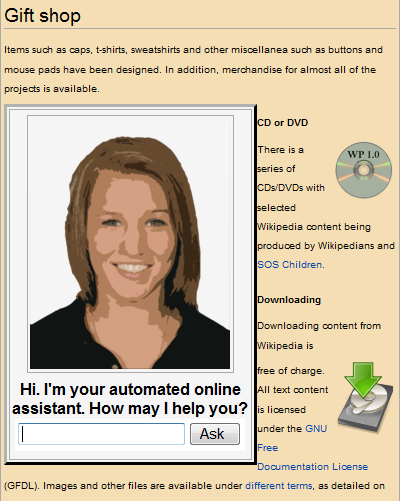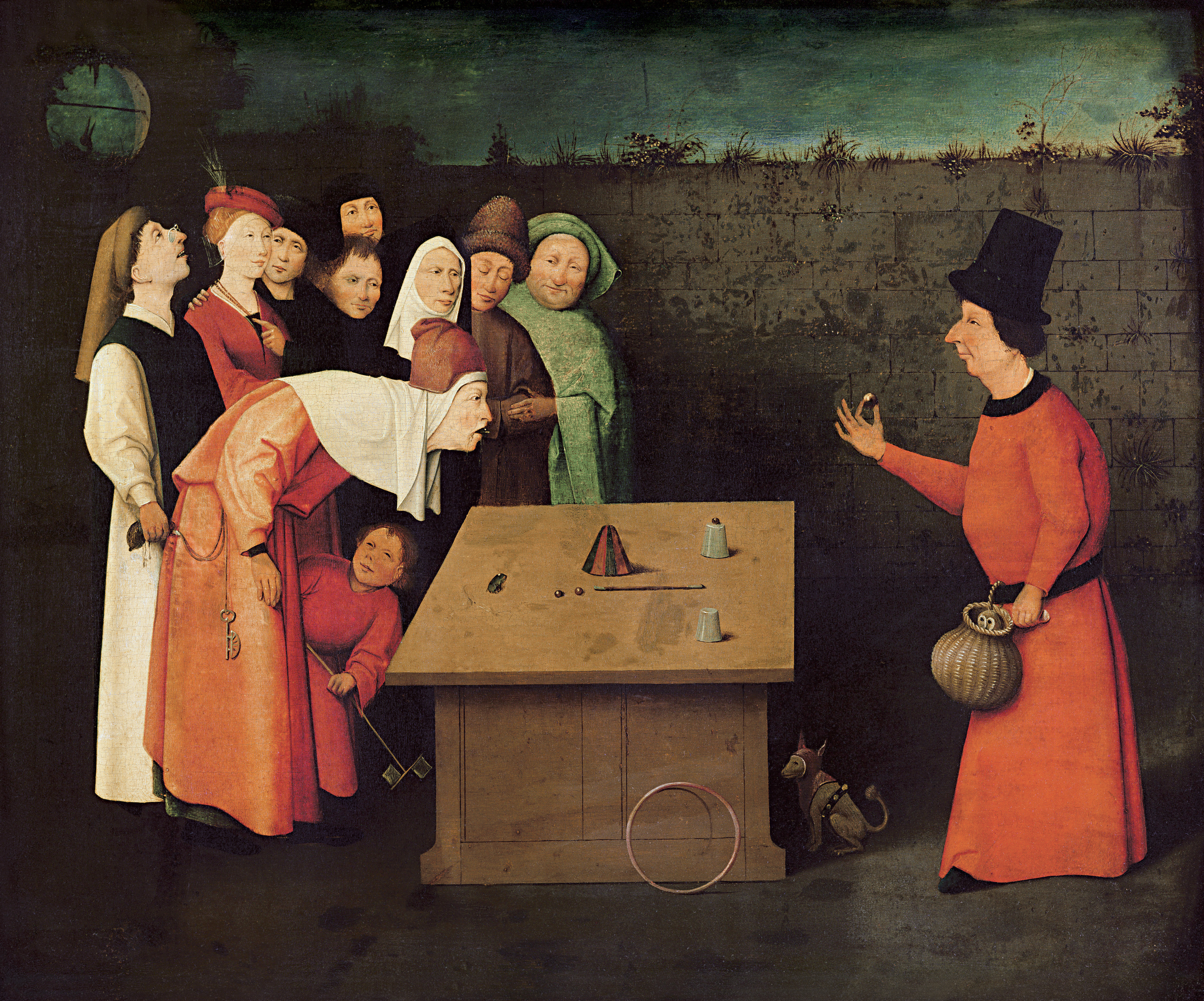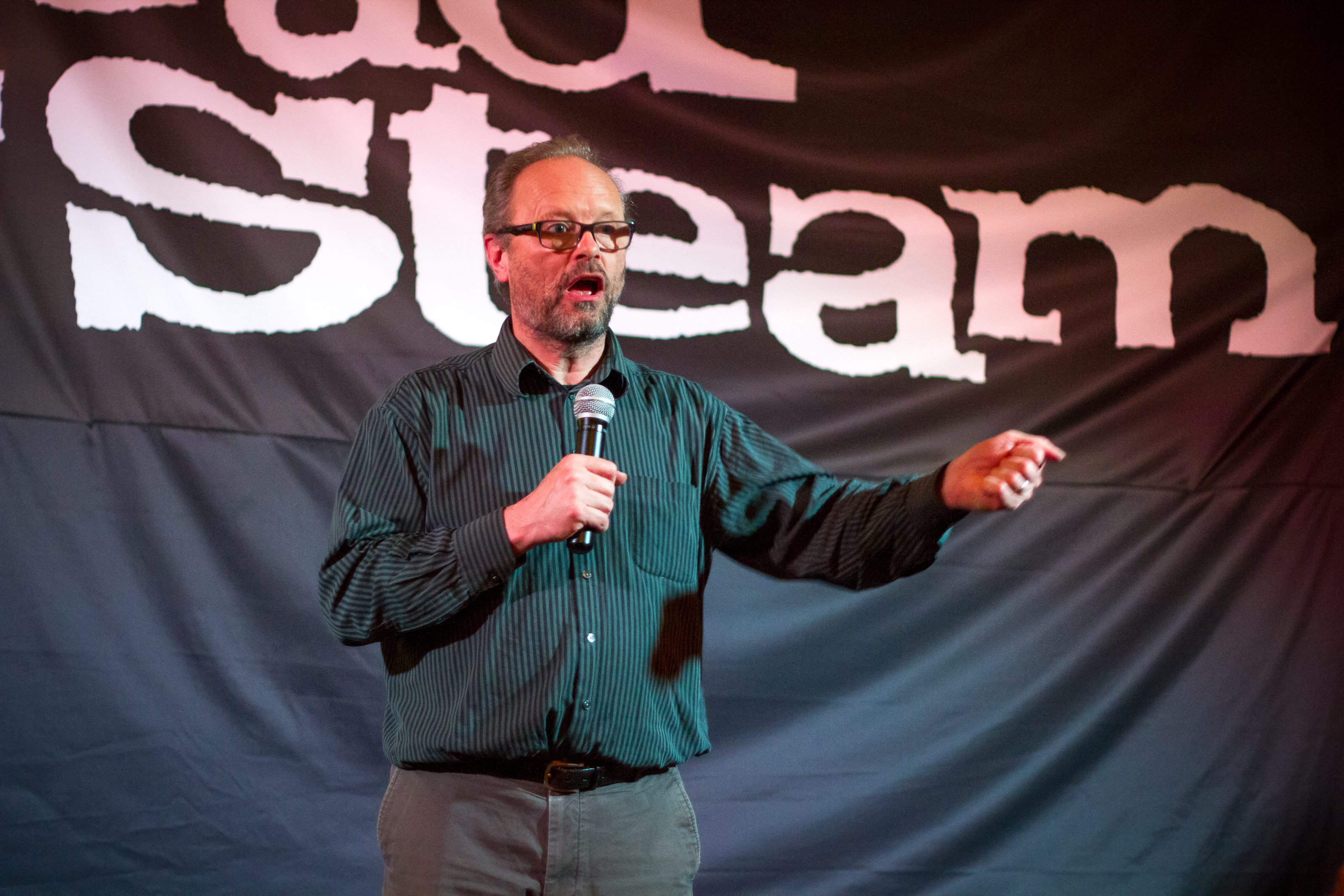|
Eugene Goostman
Eugene Goostman is a chatbot that some regard as having passed the Turing test, a test of a computer's ability to communicate indistinguishably from a human. Developed in Saint Petersburg in 2001 by a group of three programmers, the Russian-born Vladimir Veselov, Ukrainian-born Eugene Demchenko, and Russian-born Sergey Ulasen, Goostman is portrayed as a 13-year-old Ukrainian boy—characteristics that are intended to induce forgiveness in those with whom it interacts for its grammatical errors and lack of general knowledge. The Goostman bot has competed in a number of Turing test contests since its creation, and finished second in the 2005 and 2008 Loebner Prize contest. In June 2012, at an event marking what would have been the 100th birthday of the test's author, Alan Turing, Goostman won a competition promoted as the largest-ever Turing test contest, in which it successfully convinced 29% of its judges that it was human. On 7 June 2014, at a contest marking the 60th anniversar ... [...More Info...] [...Related Items...] OR: [Wikipedia] [Google] [Baidu] |
Chatbot
A chatbot or chatterbot is a Software agent, software application used to conduct an on-line chat conversation via text or Speech synthesis, text-to-speech, in lieu of providing direct contact with a live human agent. Designed to convincingly simulate the way a human would behave as a conversational partner, chatbot systems typically require continuous tuning and testing, and many in production remain unable to adequately converse, while none of them can pass the standard Turing test. The term "ChatterBot" was originally coined by Michael Loren Mauldin, Michael Mauldin (creator of the first Verbot) in 1994 to describe these conversational programs. Chatbots are used in dialog systems for various purposes including customer service, request routing, or information gathering. While some chatbot applications use extensive word-classification processes, natural language processing, natural-language processors, and sophisticated Artificial intelligence, AI, others simply scan for gene ... [...More Info...] [...Related Items...] OR: [Wikipedia] [Google] [Baidu] |
University Of Reading
The University of Reading is a public university in Reading, Berkshire, England. It was founded in 1892 as University College, Reading, a University of Oxford extension college. The institution received the power to grant its own degrees in 1926 by royal charter from King George V and was the only university to receive such a charter between the two world wars. The university is usually categorised as a red brick university, reflecting its original foundation in the 19th century. Reading has four major campuses. In the United Kingdom, the campuses on London Road and Whiteknights are based in the town of Reading itself, and Greenlands is based on the banks of the River Thames in Buckinghamshire. It also has a campus in Iskandar Puteri, Malaysia. The university has been arranged into 16 academic schools since 2016. The annual income of the institution for 2016–17 was £275.3 million of which £35.4 million was from research grants and contracts, with an expenditur ... [...More Info...] [...Related Items...] OR: [Wikipedia] [Google] [Baidu] |
Misdirection (magic)
In theatrical magic, misdirection is a form of deception in which the performer draws audience attention to one thing to distract it from another. Managing audience attention is the aim of all theater, and the foremost requirement of all magic acts. Whether the magic is of a "pocket trick" variety or a large stage production, misdirection is the central secret. The term describes either the effect (the observer's focus on an unimportant object) or the sleight of hand or patter (the magician's speech) that creates it. It is difficult to say who first coined the term, but an early reference to misdirection appears in the writing of an influential performer and writer, Nevil Maskelyne: "It consists admittedly in misleading the spectator's ''senses,'' in order to screen from detection certain details for which secrecy is required." Around the same time, magician, artist and author Harlan Tarbell noted, "Nearly the whole art of sleight of hand depends on this art of misdirection." ... [...More Info...] [...Related Items...] OR: [Wikipedia] [Google] [Baidu] |
Gary Marcus
Gary F. Marcus (born February 8, 1970) is a professor emeritus of psychology and neural science at New York University. In 2014 he founded Geometric Intelligence, a machine-learning company later acquired by Uber. Marcus's books include '' Guitar Zero,'' which appeared on the ''New York Times'' Best Seller list, and ''Kluge,'' which was a ''New York Times'' Editors' Choice. Marcus challenges connectionist theories which rely on random connections and argues instead that neurons can be put together into circuits that do things such as process rules or process structured representations. He hypothesizes that a small number of genes account for the functioning of the intricate human brain. He criticizes the use of massive amounts of data to build artificial intelligence systems, arguing: "If we are to build artificial general intelligence, we are going to need to learn something from humans, how they reason and understand the physical world, and how they represent and acquire lang ... [...More Info...] [...Related Items...] OR: [Wikipedia] [Google] [Baidu] |
Rollo Carpenter
Rollo Carpenter (born 1965) is the British-born creator of Jabberwacky and Cleverbot, learning Artificial Intelligence (AI) software. Carpenter worked as CTO of a business software startup in Silicon Valley. Career His brother is the artist Merlin Carpenter. In 2005 Carpenter co-authored "Computing Machinery and the Individual: the Personal Turing Test". He serves as managing director of Existor Ltd, a company developing AI for entertainment, companionship and communication and education. His AI entries George and Joan were #1 for Loebner Prize The Loebner Prize was an annual competition in artificial intelligence that awards prizes to the computer programs considered by the judges to be the most human-like. The prize is reported as defunct since 2020. The format of the competition was tha ... (2005) and (2006). In 2010, Carpenter won the British Computer Society's Machine Intelligence Competition. Cleverbot In 2011, Cleverbot, a learning Artificial Intelligence conversat ... [...More Info...] [...Related Items...] OR: [Wikipedia] [Google] [Baidu] |
Cleverbot
Cleverbot is a chatterbot web application that uses machine learning techniques to have conversations with humans. It was created by British AI scientist Rollo Carpenter. It was preceded by Jabberwacky, a chatbot project that began in 1988 and went online in 1997. In its first decade, Cleverbot held several thousand conversations with Carpenter and his associates. Since launching on the web, the number of conversations held has exceeded 150 million. Besides the web application, Cleverbot is also available as an iOS, Android, and Windows Phone app. Operation Unlike some other chatterbots, Cleverbot's responses are not pre-programmed. Instead, it learns from human input: Humans type into the box below the Cleverbot logo and the system finds all keywords or an exact phrase matching the input. After searching through its saved conversations, it responds to the input by finding how a human responded to that input when it was asked, in part or in full, by Cleverbot. Cleverbot part ... [...More Info...] [...Related Items...] OR: [Wikipedia] [Google] [Baidu] |
Techniche
Techniche is the annual Techno-Management festival of Indian Institute of Technology (IIT), Guwahati. The festival was started in 1999 by a group of students within the IIT Guwahati campus. Spread over three days and four nights, Techniche is generally conducted towards the end of August each year. Brief history Beginning its journey in two rooms within the Technology Complex of IIT GuwahatiHow Techniche got started, Techniche has grown exponentially over the years, spreading its wings to nearly 50K participants from varied colleges, schools and institutions all across India, UAE, Bangladesh and Singapore. It has been successful in promoting and honing scientific and entrepreneurial skills in the academia. The symbol of Techniche is two pixelated saplings, orange and blue in color. The saplings are the portrayal of how Techniche integrates the youth from all around the country While the blue color stands for the management face, the orange represents the technological front of Te ... [...More Info...] [...Related Items...] OR: [Wikipedia] [Google] [Baidu] |
Press Release
A press release is an official statement delivered to members of the news media for the purpose of providing information, creating an official statement, or making an announcement directed for public release. Press releases are also considered a primary source, meaning they are original informants for information. A press release is traditionally composed of nine structural elements, including a headline, dateline, introduction, body, and other components. Press releases are typically delivered to news media electronically, ready to use, and often subject to "do not use before" time, known as a news embargo. A special example of a press release is a communiqué (), which is a brief report or statement released by a public agency. A communiqué is typically issued after a high-level meeting of international leaders. Using press release material can benefit media corporations because they help decrease costs and improve the amount of material a media firm can output in a cer ... [...More Info...] [...Related Items...] OR: [Wikipedia] [Google] [Baidu] |
Robert Llewellyn
Robert Llewellyn (born 10 March 1956) is a British actor, comedian, presenter and writer. He plays the mechanoid Kryten in the sci-fi television sitcom ''Red Dwarf'' and formerly presented the engineering gameshow ''Scrapheap Challenge''. He has also founded and hosts a YouTube series, ''Fully Charged''. Early life Llewellyn was born in Northampton, England. Early career Llewellyn's first foray into the world of show business started out as a hobby, organising a few amateur cabaret evenings in a riverside warehouse overlooking Tower Bridge in London. The shows were a great success and he eventually helped form an alternative comedy theatre group called The Joeys. Within six months, he had stopped working as a shoemaker and started performing professionally with the group alongside Bernie Evans, Nigel Ordish and Graham Allum. The group toured Britain and France in the early 1980s, with an initial idea of exploring sexual politics between men. Llewellyn wrote much of the mater ... [...More Info...] [...Related Items...] OR: [Wikipedia] [Google] [Baidu] |
Red Dwarf
''Red Dwarf'' is a British science fiction comedy franchise created by Rob Grant and Doug Naylor, which primarily consists of a television sitcom that aired on BBC Two between 1988 and 1999, and on Dave since 2009, gaining a cult following. The series follows low-ranking technician Dave Lister, who awakens after being in suspended animation for three million years to find that he is the last living human, and that he is alone on the mining spacecraft ''Red Dwarf''—save for a hologram his deceased bunkmate Arnold Rimmer and "Cat", a life form which evolved from Lister's pregnant cat. As of 2020, the cast includes Chris Barrie as Rimmer, Craig Charles as Lister, Danny John-Jules as Cat, Robert Llewellyn as the sanitation droid Kryten, and Norman Lovett as the ship's computer, Holly. To date, twelve series of the show have aired, (including one miniseries), in addition to a feature-length special ''The Promised Land''. Four novels were published from 1989 to 1996. Two pilot ep ... [...More Info...] [...Related Items...] OR: [Wikipedia] [Google] [Baidu] |
Mark Pagel
Mark David Pagel FRS (born 5 June 1954 in Seattle, Washington) is an evolutionary biologist and professor. He heads the Evolutionary Biology Group at the University of Reading. He is known for comparative studies in evolutionary biology. In 1994, with his spouse, anthropologist Ruth Mace, Pagel pioneered the Comparative Method in Anthropology. Education Pagel was a student educated at the University of Washington where he was awarded a PhD in Mathematics in 1980 for work on ridge regression. Research During the late 1980s, Pagel worked on developing ways to analyse species relatedness, in the zoology department at the University of Oxford. Having met there, in 1994, Pagel and anthropologist Ruth Mace co-authored a paper, "The Comparative Method in Anthropology", that used phylogenetic methods to analyse human cultures, pioneering a new field of science — using evolutionary trees, or phylogenies, in anthropology, to explain human behaviour. Pagel's interests include evolution ... [...More Info...] [...Related Items...] OR: [Wikipedia] [Google] [Baidu] |
Fellow Of The Royal Society
Fellowship of the Royal Society (FRS, ForMemRS and HonFRS) is an award granted by the judges of the Royal Society of London to individuals who have made a "substantial contribution to the improvement of natural science, natural knowledge, including mathematics, engineering science, and medical science". Fellow, Fellowship of the Society, the oldest known scientific academy in continuous existence, is a significant honour. It has been awarded to many eminent scientists throughout history, including Isaac Newton (1672), Michael Faraday (1824), Charles Darwin (1839), Ernest Rutherford (1903), Srinivasa Ramanujan (1918), Albert Einstein (1921), Paul Dirac (1930), Winston Churchill (1941), Subrahmanyan Chandrasekhar (1944), Dorothy Hodgkin (1947), Alan Turing (1951), Lise Meitner (1955) and Francis Crick (1959). More recently, fellowship has been awarded to Stephen Hawking (1974), David Attenborough (1983), Tim Hunt (1991), Elizabeth Blackburn (1992), Tim Berners-Lee (2001), Venki R ... [...More Info...] [...Related Items...] OR: [Wikipedia] [Google] [Baidu] |







